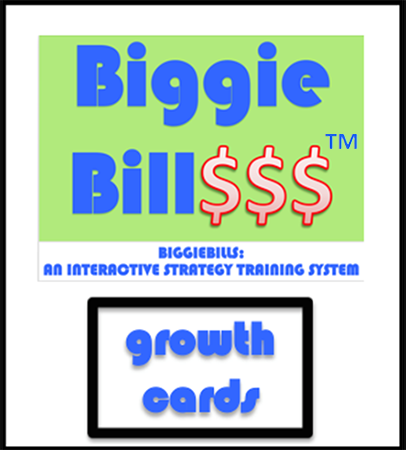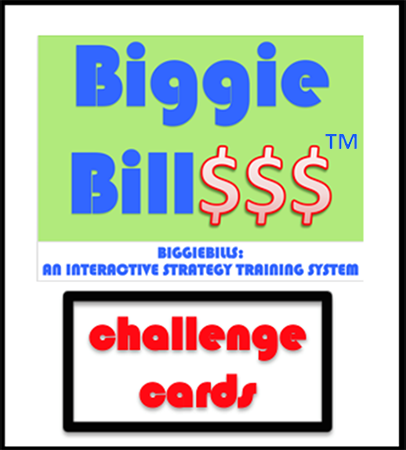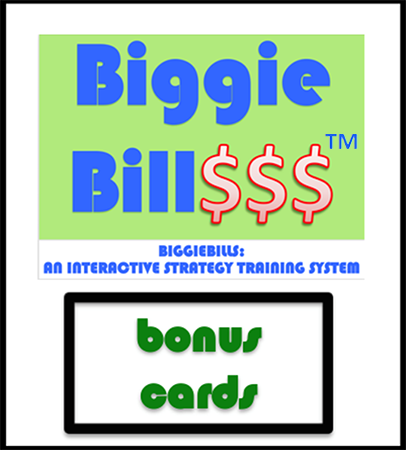How to Play
THE BASICS OF THE GAME
BiggieBills$$$™ is a patented interactive business strategy game. The game is played by 3-8 teams made up of 3 to 6 players each. Teams take on the role of an established business trying to gain the top position in its industry by being the first team to make a billion dollars! The teams play GROWTH CARDS to progress from Stage 1 to Stage 4 while dealing with possible CHALLENGE CARDS played by opposing teams. In addition, each team has to deal with the impact of changes in the industry rules based on the INDUSTRY CARDS randomly assigned by the game moderator for each Business Cycle. The game may last 1-2. Teams may earn BONUS CARDS which can change the direction of the game instantaneously.

There are 24 unique Growth Cards (3 sets for 3-4 teams; 6 sets for 5-8 teams). Growth Cards are categorized from Stage 1 to Stage 4. Growth Cards are used to grow the firm and to progress across all 4 stages. To play a Growth Card teams must pay the cost listed on the card and this cost is deducted from the team’s bank account. If a team cannot afford the cost to play a Growth Card, then the team will be prohibited from playing that specific growth card.
All Growth Cards played by a team are successfully completed at the team’s next turn or when the Business Cycle ends. The first team to successfully complete a Growth Card receives a higher payoff while teams that complete the same Growth Card second (or later) will receive a lower payoff (as described on the growth card). Each team can successfully complete each unique Growth Card once.
If a Growth Card is challenged, it will not be successfully completed, and the team may play that Growth Card again. More than one team can challenge a Growth Card. When a Growth Card is challenged, there is no payoff and the team loses their initial investment (the cost of playing the card) and pays the penalty (as listed in the Growth Card) to the team who successfully challenged them.
For example, if a Team plays the “Vendor Management” Growth Card (a Stage 1 card) and is not challenged by any other team before its next turn then the “Vendor Management” Growth Card is Successful and the team collects the reward amount listed on the card. But if the Growth Card is challenged then the team loses their initial investment and must pay the penalty to every team that challenged them.

There are 24 unique Challenge Cards (2 sets for 3-4 teams; 4 sets for 5-8 teams). These cards are played to challenge other team’s Growth Cards. There is no cost to play a Challenge Card, however, an instant payoff is received from the team whose Growth Card was challenged. Playing a Challenge Card counts toward a team’s turn. Any team may use their turn to challenge an active Growth Card played by another team. The challenging team must:
- Possess the specific Challenge Card that corresponds to the Growth Card being challenged
- A team is eligible to use the Challenge Card, if they have successfully completed at least one Growth Card of the same Stage as the Challenge Card. Once an active Growth Card is challenged, any other team can additionally challenge this Growth Card (if they have the corresponding challenge card or a flexible bonus card), and the eligibility requirement is waived for the second or later challenger.

There are 24 unique cards that state the rules for each Business Cycle (two turns). No Industry Rules Card is selected for the first Business Cycle at the start of the game. At the beginning of next new Business Cycle, an Industry Rules Card is randomly selected by the game moderator. The changes in the rules due to the Industry Card are announced and are in effect for only one Business Cycle.

There are two types of Bonus Cards: Flexible Challenge Cards that Challenge any Growth Card (in the specified Stage) and Block a Challenge cards that block a challenge to any Growth Card. There are 24 “Flexible Challenge Cards”-12 cards can be used for stages 1& 2 and 12 cards can be used for stages 3&4 and 24 “Block a Challenge” cards for a total of 48 Bonus Cards in a game of 3-4 teams and then doubled for 5 to 8 teams. Bonus Cards are not dealt to teams are earned while playing the game.
- Earning a Bonus Card: When a team successfully completes three Growth Cards in any one stage, the team earns one Bonus Card. If a team completes a fourth Growth Card in the same stage, it can earn an additional Bonus Card. A team can earn only two Bonus Cards per stage. In total, a team can earn 8 Bonus Cards for the entirety of the game.
There are 4 ways a team is declared the Winner of BiggieBills$$$™:
- When any one team accumulates a total of One Billion Dollars, the game ends and that team wins the game. If all team players agree, the target dollar amount can be changed (e.g. Two Billion Dollars). However, such a target may extend the time of play.
- When only one team remains and all other teams have been declared bankrupt (zero or negative cash balance), the game ends, and the surviving team is declared the winner, even if the surviving team has not reached the One Billion Dollars target.
- In the rare event that two teams reach One Billion Dollars in the same turn, simultaneously, the team with the most money is declared the winner. In the event that the two teams have the same amount of money, the team with the highest number of completed Growth Cards wins.
- When playing with time limits, the team with the most money wins at the end of the set time. If two teams have the same amount of money, the team with the highest number of completed Growth Cards wins.
- Each team starts with $200 Million in their respective Bank accounts. The moderator of the game manages the bank balance for each team but the bank balance of each team is visible to all players at any point time.
- 2. Each team is randomly dealt 6 Growth Cards and 4 Challenge Cards by the game moderator. These 10 cards form each team’s starting hand and are kept secret from other teams so as to not reveal each team’s portfolio of cards to others. Playing a growth card costs money to a team (in near term, but provides a payoff later). When a team plays a challenge card, it allows for earning an instant payoff but no additional payoff in the long term.
- No Bonus Cards are dealt to any team. Bonus cards have to earned by each team. Earning bonus card can change a team’s strategic options in later part of the game.
- No Industry Rules Cards are dealt to any team. After a completion of a business Cycle, the moderator announces a new industry card that may have a positive or negative impact on teams based on their past actions.
For participants playing the online version of the game, download details will be provided via a separate communication.
-
PLAYING A TURN:
Throughout the game, teams attempt to progress through
four Stages which represent the growth of their business
entity. BiggieBills$$$™ is played over a series of
turns, in
which each team will have an opportunity to select and
play a card or multiple cards as per Industry Rules for
that Business Cycle on the team progress Board/Screen.
During their turn, each team may perform one of the
following actions:
- PLAY A GROWTH CARD All teams must begin the game by playing a Stage 1 Growth Card. After successfully completing a Stage 1 Growth Card a team can then play a Growth Card from any stage as long as they have successfully completed at least one Growth Card from a previous stage. Having successfully completed a higher stage Growth Card, a team can go back to playing a lower stage Growth Card at any time in the game. A team can play a Growth Card by paying the cost of that Growth Card as listed on the card. The team must have sufficient amount of money in their bank account to pay for the cost of playing that Growth Card (for example, if a Team only has $50 million in its bank account and the cost of Growth Card to be played is $100 million then the team cannot play that Growth Card). A team may play two Growth Cards in a turn if the Industry Rules allow it during a given Business Cycle. When a team plays a Growth Card, it must draw another Growth Card from the Game Moderator.
- PLAY A CHALLENGE CARD A team can play a Challenge Card as a first challenger if that team has the Challenge Card specific to an active Growth Card and is eligible by having completed a Growth Card of the same stage. If the team is a second challenger then it can play the Challenge Card without having completed a Growth Cardin that stage, or by using a flexible challenge Bonus Card. A team may play two Challenge Cards in a turn if the industry rules card allows it during a given Business Cycle. If a team chooses to challenge a Growth Card played by another team it will lose its chance to play a Growth Card for that turn (unless of course industry rules allow to play two cards). Unsuccessful Challenge Cards: A Challenge Card is null and void if a Block the Challenge Card (Bonus Card) is played by the team that is being challenged (please see Appendix A, for details on Bonus Cards). In such an event, the Growth Card remains active and the challenging Team pays the penalty listed on the Challenge Card to the team that played the Block the Challenge Bonus Card
- EXCHANGE CARDS If a team is unable to play a Growth or Challenges Card, it may choose to play a Bonus Card or exchange two cards from its possession by drawing two cards from the Game Moderator. The exchange of cards will cost the team$5 million and the process of exchange will be considered as the team’s turn. If this action is selected, no other cards except for a Bonus Card can be played during the team’s turn. A team may exchange any combination of Growth or Challenges Cards (for example, a team may choose to exchange two Growth Cards, or two Challenge Cards or one of each).
- SKIP A TURN AND REMAIN INACTIVE If a team selects this action, a penalty (a fine) of $10 million for being inactive is incurred.
- PLAYING A BONUS CARD There are two types of Bonus Cards: Flexible Challenge and Block a Challenge The Flexible Challenge Bonus Card is used to challenge an active Growth Card that was played by another team and playing the bonus card does not prevent a team from playing a regular growth or challenge card. In other words, if a team possesses a Flexible Challenge Bonus Card, the team must wait to play it during a turn, the team can still play another Growth Card or a Challenge Cardin addition to this Flexible Challenge Bonus Card. A team may play the Flexible Challenge Bonus Card as a turn. If Industry Rules allow Two-card Play during a turn then a team can play two bonus cards along with two Growth/Challenge Cards. Payoff due to the challenge card use is immediately reflected in the score card. The Block a Challenge Bonus Card is used to “Block” a Challenge Card against only one challenge. This card can be used immediately and out of turn only by the team that is being challenged. No other team other than the team being challenged a growth card can use a bonus card to block a challenge. After using the block a challenge card, the Growth Card remains active and the challenging team pays the penalty listed on the Challenge Card to the team that played the Block the Challenge Bonus Card. The payment of penalty is reflected immediately in the score keeping.
- RECEIVING NEW CARDS When a Growth Card or a Challenge Card are played, the team will receive a replacement card of the same type. Any played Bonus Cards are not replaced, these have to be earned.
- DRAWING CARDS After playing either a Growth Card or a Challenge Cardas itsturn, the team draws a replacement card from the respective deck from the Game Moderator. Any played Bonus Cards are not replacedby drawing Bonus Cards, these have to be earned.
-
BUSINESS CYCLES
A Business Cycle consists of two turns for each team.
- For each new business cycle the game there will be a new randomly generated order of for the teams.
- At the beginning of each business cycle, the moderator will randomly choose an Industry Rule Card. The new Industry Rules can be found at the bottom of the screen and will remain are in effect for only one Business Cycle. Please note at the beginning of the game no Industry Rule Card is applied.
- When one business cycle ends any Growth Cards that are active in the game for all teams are automatically converted to successfully completed and teams will collect the payoff related to these completed Growth Cards.
- No team in the new business cycle can challenge a Growth Card from the previous business cycle.
-
STAGES of BiggieBills$$$™
- All teams start the game at Stage 1.
- In order to progress from one stage to another, teams must successfully complete any one Growth Card in a lower stage prior to playing a Growth Card in a higher stage. For example, to play a Stage 2 Growth Card, a team must have successfully completed at least one Stage 1 Growth Card, and in order to play a Stage 3 Growth Card a team must have successfully completed at least one Stage 2 Growth Card, and so on.
- A team may play Growth Cards of lower Stages even after successfully completing a Growth Card of a higher Stage. For example, a team successfully completes one Growth Card in Stage1, then plays a Growth Card from Stage 1 or choose to play a Growth Card from Stages 1, 2, or move on to Stage 3.
- MANAGING DUPLICATE CARDS Duplicate Growth Cards Since there are 3 (6 for 5-8 teams) copies of each unique Growth Card, it is possible that a team may receive duplicate Growth Cards. For example, if a team has duplicate “Vendor Management” cards and plays one “Vendor Management Card” and this card is successfully completed, then the second “Vendor Management Card” is rendered useless to this team. This is because the team can only successfully complete a Growth Card of each type once. However, if the first “Vendor Management” card is challenged by another team, then the team may play the second card in a future turn. Or it may hold on to the duplicate card and thereby deny another team a chance to play this particular Growth Card. Teams may choose to exchange duplicate cards (see EXCHANGE CARDS). Duplicate Challenge Cards Since there are 2 (4 for 5-8 teams) copies of each unique Challenge Card, it is possible that a team may receive duplicate Challenge Cards. For example, if a team has duplicate “Challenge Vendor Management”, they may challenge Team A in the current turn and retain the duplicate to Challenge Team D in a future turn. A team may choose to exchange duplicate cards (see EXCHANGE CARDS), or retain it so as to prevent other teams from playing it.
-
ACQUIRING A COMPETITOR (Stage 4 Growth Card):
- Any team that has progressed to Stage 4 can acquire another team by playing the “Acquire a Competitor” Growth Card. Note that just like any other Growth Card, ACQUIRING A COMPETITOR card can be used successfully ONLY ONCE.
-
In order to play the “Acquire a Competitor” Growth
Card, a team must meet the following criteria:
- Have the “Acquire a Competitor” Growth Card
- Have completed growth stages 1, 2 and 3.
- Have Cash-on-Hand that is 75% or more than that of the team to be acquired at the beginning of the current turn of the Business Cycle.
- Once the “Acquire a Competitor” Growth Card is played, it is like any other Growth Card and other teams may use a Challenge Card to stop this acquisition. If another team uses a Challenge Card then the acquisition fails unless a Block the Challenge Bonus Card is played by the acquiring team, if they have one. If a Block the Challenge Bonus Card is played no other team may challenge this acquisition.
- If no challenges are issued, the acquiring team will receive the payout and complete acquisition of the target team on their next turn.
- If successfully played, the playing team acquires the target team, and the target team is out of the game (Target team loses).
- The acquiring team receives 25% of the target team’s cash balance and all the Growth Cards, Challenge Cards, and Bonus Cards. For example, if the target team’s bank balance was $400 million then the acquiring team receives $100 million (25% of the cash balance) and also the payoff as listed on the “Acquire a Competitor” Growth Card. Once this transaction is complete the acquiring team must select only Choose 6 Growth Cards and 4 Challenge Cards for their team (from the combined set of cards form the target and acquirer teams) and the remaining cards will be returned to the Game Moderator. The acquiring team retains all Bonus Cards obtained through acquisition.